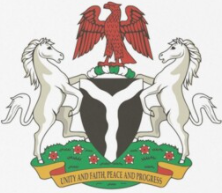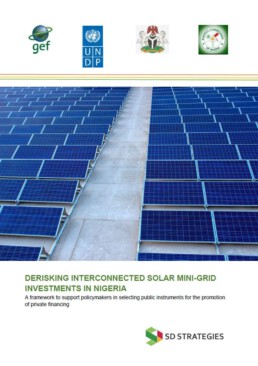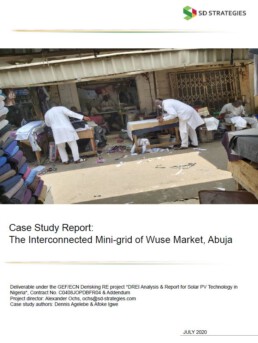



DE-RISKING INTERCONNECTED SOLAR MINI-GRID INVESTMENTS IN NIGERIA
BACKGROUND
Interconnected mini-grids (IMGs) rapidly gain traction as a high-potential stepping stone toward United Nations Sustainable Development Goal 7, “to ensure access to affordable, reliable, sustainable and modern energy for all.” The government of Nigeria, Africa’s most populous country and its largest economy, has long made better energy services for its citizens a key priority. More recently, it identified IMGs as a plausibly powerful solution to increase the share of renewables in the electricity mix; improve the reliability and flexibility of electricity supply; as well as provide electricity to low-income populations.
PROJECT
This project identifies and analyses key risks and barriers to private-sector investment in IMGs in Nigeria – and evaluates policy and financial instruments designed to address them. We focus on solar PV IMGs combined with batteries. The ultimate objective of the project is to contribute to accelerating private sector-led deployment of IMGs at scale.
METHODOLOGY
The project team adapted the Derisking Renewable Energy Investment (DREI) methodology of the United Nations Development Programme (UNDP) to develop an expert survey that is specifically tailored to IMG investments. It assesses 10 risk categories: social acceptance, hardware, digital, labour, energy market, developer, end-user credit, financing, currency, and sovereign risk. Each risk category consists of one or more underlying barriers, adding up to 23 barriers in total; and each of these barriers has been paired with a specific policy and/or finance instrument that can effectively mitigate it. Fifteen experts of the IMG market provided in-depth insights through written survey answers, and in most cases follow-up in-person interviews. The final project report provides and contextualises their quantitative ratings and qualitative commentary.
SURVEY RESULTS
“Volatility of local currency”; “capital scarcity – liquidity constraints in domestic banking”; and “low developer creditworthiness and cash flow strength” are the three highest rated barriers, respectively, in terms of first, likelihood of their occurrence, and second, their impact, should they occur. The three lowest ranking ones following the same assessment of likelihood and impact are “uncertainty or inflexibility in tariff regulations”, “uncertainty related to technical requirements for mini-grids”, and “resistance by general public, local communities, competing businesses” – with the last mentioned the least powerful barrier to IMG investment evaluated in this study.
A majority of barriers receive relatively high ratings in the assessments of surveyed experts. This result is, however, hardly surprising, given that the IMG market has just recently come into existence. Only two pilot projects have thus far gone online, and though several more are currently at different stages of development, all observers agree that what they are currently witnessing is still an exploratory period for most market participants. While this study for this very reason comes relatively early, it can also provide the government with concrete suggestions for what it can do to improve the investment environment and lead IMGs to market maturity without the need of excessive public subsidies. The expert survey came to another very positive result: All barriers could be paired with concrete policy and finance instruments – and their impact, once implemented, was consistently evaluated as very high. The study provides concrete suggestions for how the individual assessed policies can be implemented in the existing market, policy, and finance landscape in Nigeria.
REPORT
The report first provides overview of Nigeria’s energy situation, the government’s development goals, and the role IMGs can play towards them. It then discusses the expert survey results. Based on these, the report presents a toolkit of priority interventions tailored to the Nigerian investment environment. A multitude of actions will allow the government to reduce, transfer, or compensate for, the identified risks and barriers. This study categorizes them in eight priority components:
- Ensure successful implementation of pilot projects – and consider lessons learned
- Enforce compliance with existing policies and regulations – and clarify responsibilities of authorities
- Design and implement new policies and regulations
- Minimize bureaucratic hurdles and provide governmental services to all key stakeholders
- Build capacities and encourage knowledge transfer
- Strengthen domestic manufacturing capacity and ease imports of components that cannot be produced domestically
- Support access to international finance
- Emphasis the government’s commitment to advancing the IMG market.
The report presents concrete policies and measures the government can employ within the above eight priority action areas.
CASE STUDY OF WUSE MARKET
It will be important to draw from the experiences currently made under the Interconnected Mini-grid Acceleration Scheme (IMAS) as well as Energizing Economics Initiative (EEI). The recently launched first component of an IMG serving the traders of Abuja’s Wuse market can provide important insights. They reach from the importance of stakeholder engagement and the communication of transparent project objectives to the negative impact of bureaucratic bottlenecks delaying the project permit approvals. The case study has been published separately. Chapter 4 of the report presents a shorter version of the case study: It portraits the set-up of Wuse Market’s first IMG installation and presents major lessons learned from the implementation of the project.


